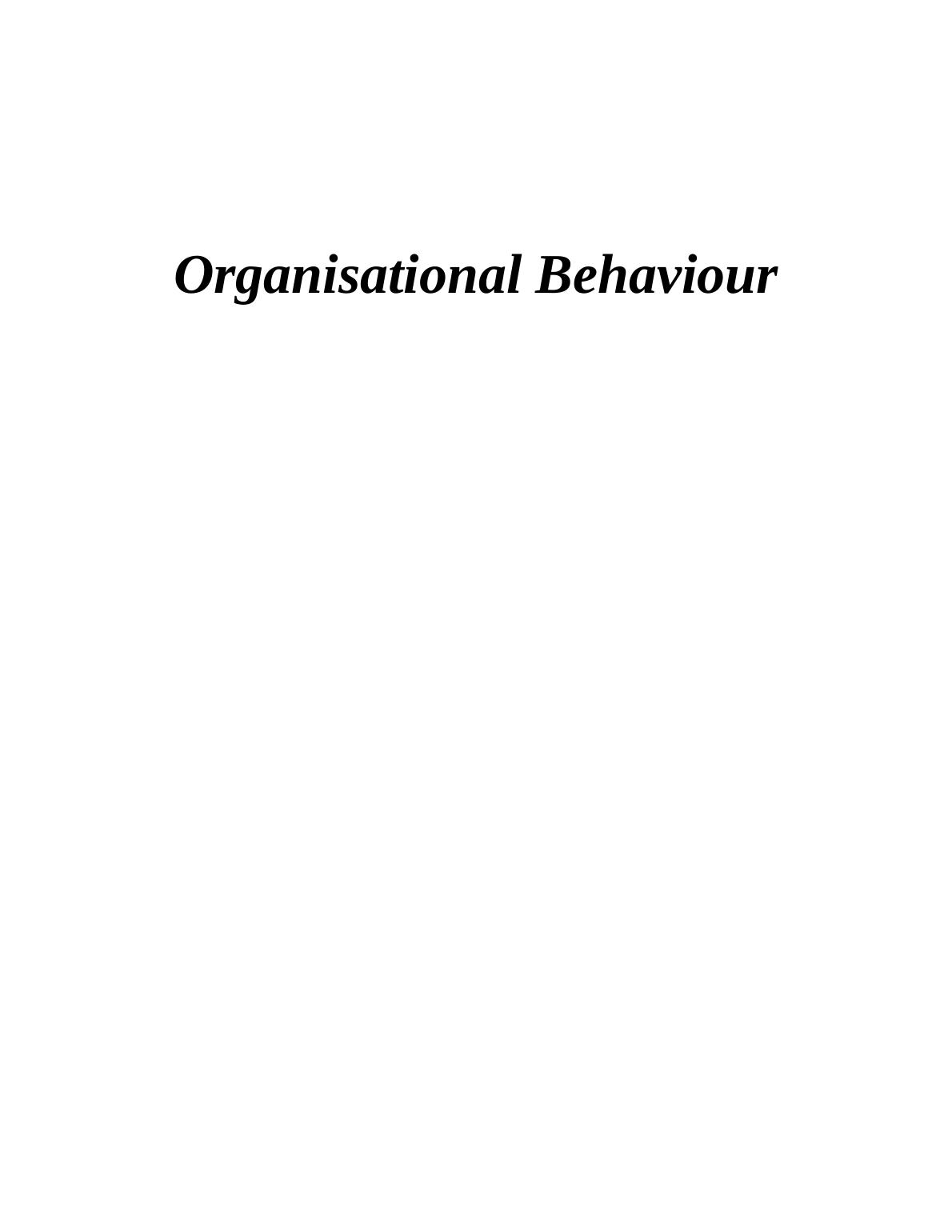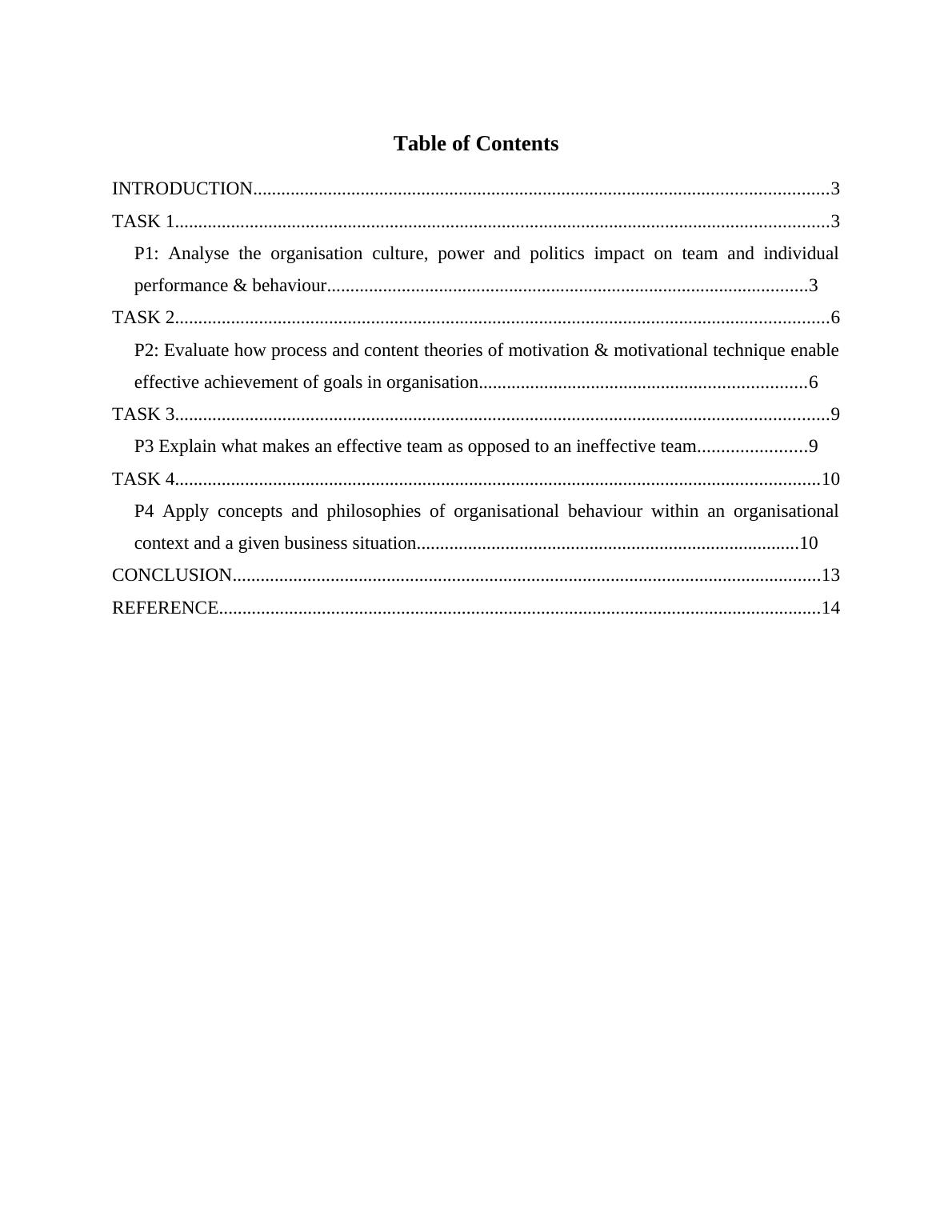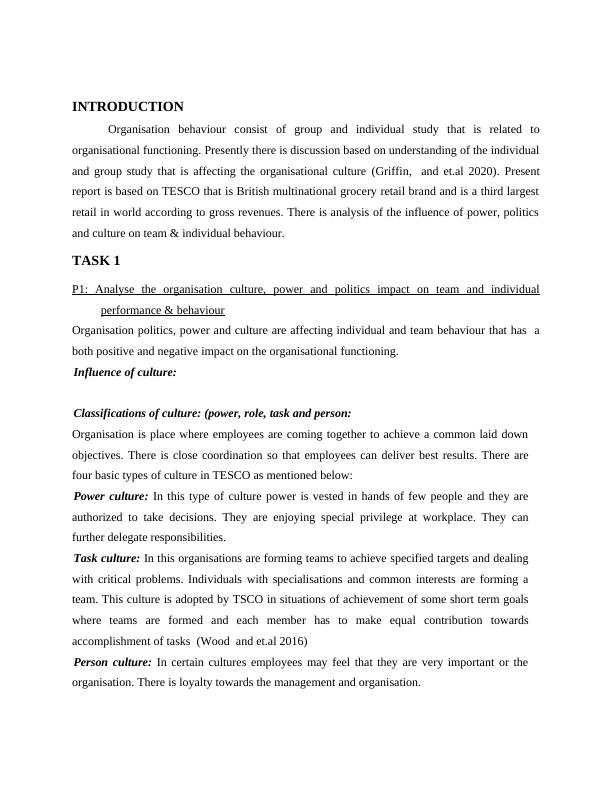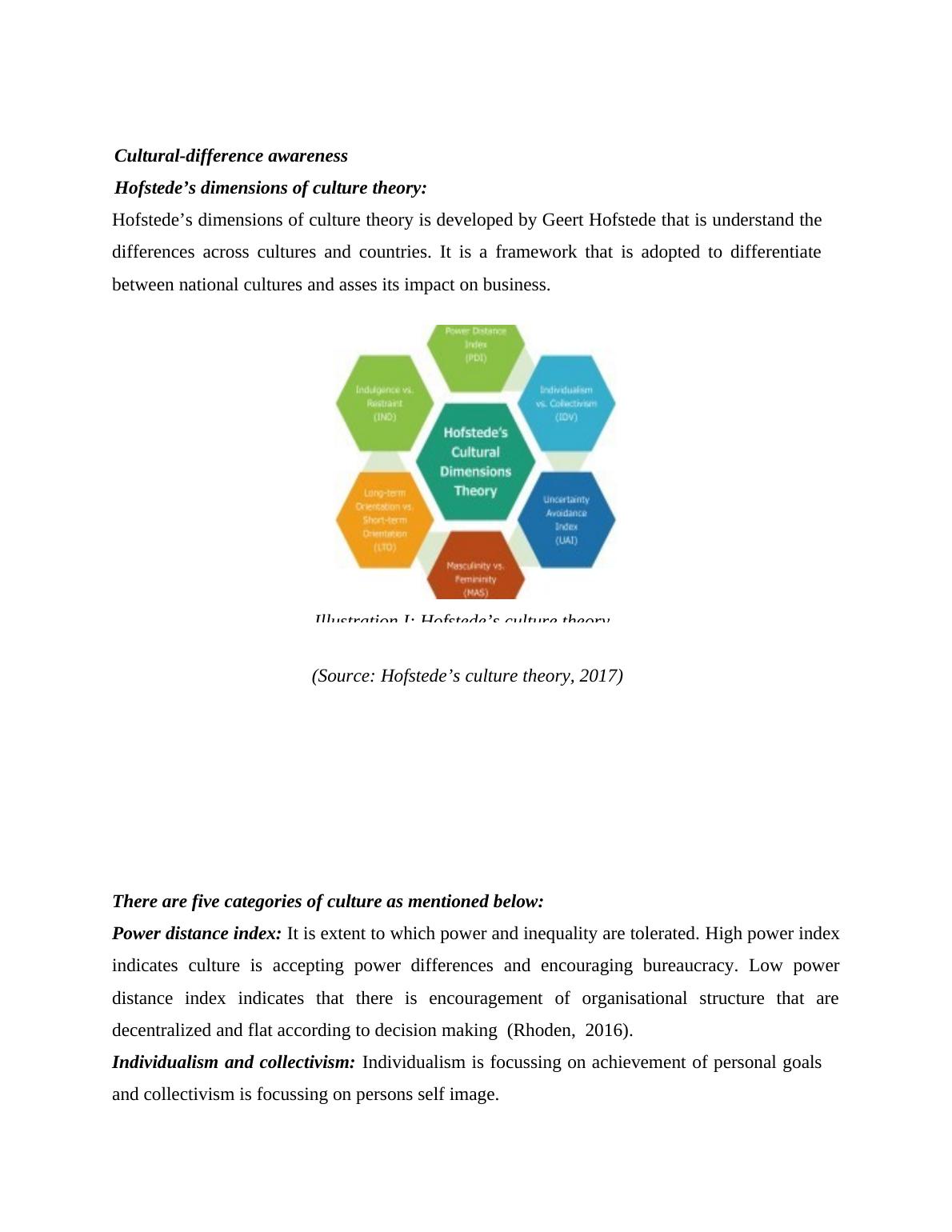Organisational Behaviour
Added on 2023-01-05
18 Pages3385 Words48 Views
Organisational Behaviour

Table of Contents
INTRODUCTION...........................................................................................................................3
TASK 1............................................................................................................................................3
P1: Analyse the organisation culture, power and politics impact on team and individual
performance & behaviour.......................................................................................................3
TASK 2............................................................................................................................................6
P2: Evaluate how process and content theories of motivation & motivational technique enable
effective achievement of goals in organisation......................................................................6
TASK 3............................................................................................................................................9
P3 Explain what makes an effective team as opposed to an ineffective team.......................9
TASK 4..........................................................................................................................................10
P4 Apply concepts and philosophies of organisational behaviour within an organisational
context and a given business situation..................................................................................10
CONCLUSION..............................................................................................................................13
REFERENCE.................................................................................................................................14
INTRODUCTION...........................................................................................................................3
TASK 1............................................................................................................................................3
P1: Analyse the organisation culture, power and politics impact on team and individual
performance & behaviour.......................................................................................................3
TASK 2............................................................................................................................................6
P2: Evaluate how process and content theories of motivation & motivational technique enable
effective achievement of goals in organisation......................................................................6
TASK 3............................................................................................................................................9
P3 Explain what makes an effective team as opposed to an ineffective team.......................9
TASK 4..........................................................................................................................................10
P4 Apply concepts and philosophies of organisational behaviour within an organisational
context and a given business situation..................................................................................10
CONCLUSION..............................................................................................................................13
REFERENCE.................................................................................................................................14

INTRODUCTION
Organisation behaviour consist of group and individual study that is related to
organisational functioning. Presently there is discussion based on understanding of the individual
and group study that is affecting the organisational culture (Griffin, and et.al 2020). Present
report is based on TESCO that is British multinational grocery retail brand and is a third largest
retail in world according to gross revenues. There is analysis of the influence of power, politics
and culture on team & individual behaviour.
TASK 1
P1: Analyse the organisation culture, power and politics impact on team and individual
performance & behaviour
Organisation politics, power and culture are affecting individual and team behaviour that has a
both positive and negative impact on the organisational functioning.
Influence of culture:
Classifications of culture: (power, role, task and person:
Organisation is place where employees are coming together to achieve a common laid down
objectives. There is close coordination so that employees can deliver best results. There are
four basic types of culture in TESCO as mentioned below:
Power culture: In this type of culture power is vested in hands of few people and they are
authorized to take decisions. They are enjoying special privilege at workplace. They can
further delegate responsibilities.
Task culture: In this organisations are forming teams to achieve specified targets and dealing
with critical problems. Individuals with specialisations and common interests are forming a
team. This culture is adopted by TSCO in situations of achievement of some short term goals
where teams are formed and each member has to make equal contribution towards
accomplishment of tasks (Wood and et.al 2016)
Person culture: In certain cultures employees may feel that they are very important or the
organisation. There is loyalty towards the management and organisation.
Organisation behaviour consist of group and individual study that is related to
organisational functioning. Presently there is discussion based on understanding of the individual
and group study that is affecting the organisational culture (Griffin, and et.al 2020). Present
report is based on TESCO that is British multinational grocery retail brand and is a third largest
retail in world according to gross revenues. There is analysis of the influence of power, politics
and culture on team & individual behaviour.
TASK 1
P1: Analyse the organisation culture, power and politics impact on team and individual
performance & behaviour
Organisation politics, power and culture are affecting individual and team behaviour that has a
both positive and negative impact on the organisational functioning.
Influence of culture:
Classifications of culture: (power, role, task and person:
Organisation is place where employees are coming together to achieve a common laid down
objectives. There is close coordination so that employees can deliver best results. There are
four basic types of culture in TESCO as mentioned below:
Power culture: In this type of culture power is vested in hands of few people and they are
authorized to take decisions. They are enjoying special privilege at workplace. They can
further delegate responsibilities.
Task culture: In this organisations are forming teams to achieve specified targets and dealing
with critical problems. Individuals with specialisations and common interests are forming a
team. This culture is adopted by TSCO in situations of achievement of some short term goals
where teams are formed and each member has to make equal contribution towards
accomplishment of tasks (Wood and et.al 2016)
Person culture: In certain cultures employees may feel that they are very important or the
organisation. There is loyalty towards the management and organisation.

Role culture: It is a culture where each employee is delegating with responsibilities and roles
according to specialisation, interest and their education qualification.
Cultural-difference awareness
Hofstede’s dimensions of culture theory:
Hofstede’s dimensions of culture theory is developed by Geert Hofstede that is understand the
differences across cultures and countries. It is a framework that is adopted to differentiate
between national cultures and asses its impact on business.
(Source: Hofstede’s culture theory, 2017)
There are five categories of culture as mentioned below:
Power distance index: It is extent to which power and inequality are tolerated. High power index
indicates culture is accepting power differences and encouraging bureaucracy. Low power
distance index indicates that there is encouragement of organisational structure that are
decentralized and flat according to decision making (Rhoden, 2016).
Illustration I: Hofstede’s culture theory
according to specialisation, interest and their education qualification.
Cultural-difference awareness
Hofstede’s dimensions of culture theory:
Hofstede’s dimensions of culture theory is developed by Geert Hofstede that is understand the
differences across cultures and countries. It is a framework that is adopted to differentiate
between national cultures and asses its impact on business.
(Source: Hofstede’s culture theory, 2017)
There are five categories of culture as mentioned below:
Power distance index: It is extent to which power and inequality are tolerated. High power index
indicates culture is accepting power differences and encouraging bureaucracy. Low power
distance index indicates that there is encouragement of organisational structure that are
decentralized and flat according to decision making (Rhoden, 2016).
Illustration I: Hofstede’s culture theory

End of preview
Want to access all the pages? Upload your documents or become a member.
Related Documents
Organisational Behaviour: Culture, Politics, Power and Motivation Theorieslg...
|17
|5636
|378
Organisational Cultures and Workforce Motivationlg...
|13
|4337
|334
Organisational Behaviour: Impact on Individual and Team Behaviourlg...
|12
|3404
|30
Effects of Culture, Power and Politics on the Organisation - Assignmentlg...
|15
|4935
|416
Impact of Culture, Politics, and Power on Individuals and Team Performancelg...
|10
|2834
|41
The Impact of Culture, Power and Politics on Organisational Behaviour and Performancelg...
|14
|3849
|82